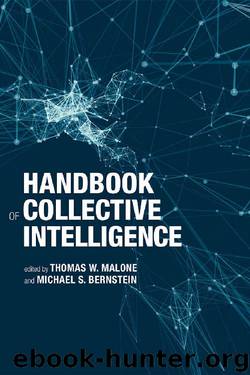Handbook of Collective Intelligence (MIT Press) by Thomas W. Malone & Michael S. Bernstein

Author:Thomas W. Malone & Michael S. Bernstein [Malone, Thomas W.]
Language: eng
Format: epub
Publisher: The MIT Press
Published: 2015-11-12T23:00:00+00:00
Cognitive Psychology
Editors’ Introduction
Even though the field of collective intelligence sees intelligence in unusual places, any comprehensive survey of the field should certainly include the first place where we humans saw something we called “intelligence”: our own minds. And although philosophers and others have been discussing various aspects of human intelligence since at least the time of Aristotle, scientific study of the phenomenon began only about 100 years ago. It has proceeded along two mostly separate paths.
One path involves measuring the differences among individuals in their mental functioning. For instance, Spearman (1904) was the first to demonstrate statistically the non-intuitive fact that there is a single statistical factor for an individual that predicts how well the individual will perform a very wide range of mental tasks. This factor is very similar to what we usually call “intelligence,” and it is what all modern IQ tests measure (Deary 2000).
The other path involves studying the mental processes that make intelligent behavior possible. Though there is not complete consensus on how to categorize these cognitive processes, a typical list (see, e.g., Reisberg 2013; Frankish and Ramsey 2012) would include perception, attention, memory, learning, decision making, and problem solving.
As an example of the second path, it is well known that there are at least two kinds of human memory. Working memory decays rapidly without conscious attention, stores verbal and visual information separately, and has very limited capacity (Atkinson and Shiffrin 1968; Baddely and Hitch 1974). Long-term memory can store much larger amounts of information for much longer times and depends strongly, for both storage and retrieval, on the meaning of the information being remembered (see, e.g., Craik and Lockart 1972).
As another example, psychologists developed the concept of “learning curves” to describe how humans often improve their performance on new tasks rapidly at first and then more slowly (see, e.g., Ebbinghaus 1885; Thorndike 1898). Later, economists and organization theorists generalized that concept to learning by other kinds of collectively intelligent systems, such as companies (Benkard 2000; Hirshleifer 1962; Argote 1999; March 1991).
From the perspective of collective intelligence, many intriguing questions involve whether—and how—these cognitive processes are manifested, not just in individual human brains, but also in groups of individuals—whether those individuals are people, computers, insects, or companies. For instance, do ant colonies (as described in the chapter on biology) have equivalents of long-term memory and working memory at the level of the whole colony? Or, as we’ll examine in the chapter on organizational behavior, how do human organizations demonstrate collective cognitive processes such as group memory, group learning, and group decision making?
In the chapter that follows, Steyvers and Miller focus on another way of bringing together an understanding of individual and group cognitive processes. Their focus is on the kind of group decision making that gives rise to the “wisdom of crowds” effect. In this kind of decision making, each member of a group estimates a quantity or selects an answer to a question, and the group’s decision is a function (often the average) of the individual answers.
Download
This site does not store any files on its server. We only index and link to content provided by other sites. Please contact the content providers to delete copyright contents if any and email us, we'll remove relevant links or contents immediately.
The Art of Thinking Clearly by Rolf Dobelli(10487)
Mindhunter: Inside the FBI's Elite Serial Crime Unit by John E. Douglas & Mark Olshaker(9339)
Change Your Questions, Change Your Life by Marilee Adams(7780)
Nudge - Improving Decisions about Health, Wealth, and Happiness by Thaler Sunstein(7706)
Mastermind: How to Think Like Sherlock Holmes by Maria Konnikova(7342)
The Power of Now: A Guide to Spiritual Enlightenment by Eckhart Tolle(5781)
Men In Love by Nancy Friday(5239)
Altered Sensations by David Pantalony(5103)
Factfulness: Ten Reasons We're Wrong About the World – and Why Things Are Better Than You Think by Hans Rosling(4742)
The Confidence Code by Katty Kay(4260)
Thinking in Bets by Annie Duke(4226)
Man and His Symbols by Carl Gustav Jung(4135)
The Worm at the Core by Sheldon Solomon(3486)
Why Buddhism is True by Robert Wright(3451)
Liar's Poker by Michael Lewis(3447)
Three Women by Lisa Taddeo(3433)
The Inner Life of Animals by Peter Wohlleben(3318)
Descartes' Error by Antonio Damasio(3277)
How Music Works by David Byrne(3268)
